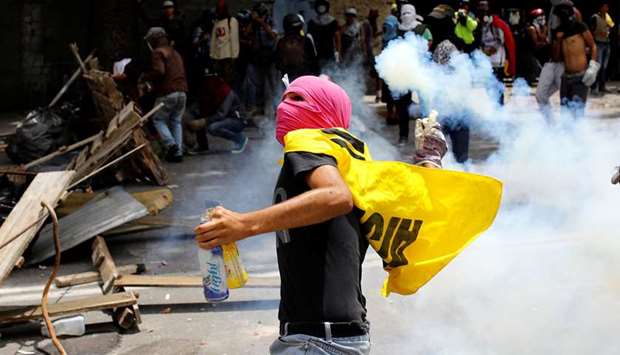The Trump administration imposed sanctions on 13 senior Venezuelan officials as the country’s opposition launched a two-day strike yesterday, heaping pressure on unpopular President Nicolas Maduro to scrap plans for a controversial new congress.
Venezuela’s long-time ideological foe the US targeted the country’s army and police chiefs, the national director of elections, and a vice president of the state oil company for alleged corruption and rights abuses.
But US President Donald Trump spared Venezuela for now from broader sanctions against its vital oil industry — although such actions are still under consideration.
US officials said the individual sanctions aimed to show Maduro that Washington would make good on a threat of “strong and swift economic actions” if he goes ahead with a vote on Sunday that critics say will cement dictatorship in the Opec nation.
The leftist leader was also feeling the heat at home, where neighbours gathered from dawn across Venezuela to block roads with rubbish, stones and tape, while many stores remained shut.
“It’s the only way to show we are not with Maduro. They are few, but they have the weapons and the money,” said decorator Cletsi Xavier, 45, standing with women blocking the entrance to a freeway in upscale east Caracas with rope and iron metal sheets.
Maduro has vowed to push ahead with Sunday’s vote for a Constituent Assembly, which will have power to rewrite the constitution and override the current opposition-led legislature.
The successor of late leader Hugo Chavez says the new superbody is the only way to bring peace back to Venezuela after four months of violent anti-government protests that have led to over 100 deaths.
Five died in a one-day strike last week.
The opposition says Sunday’s vote, which it is boycotting, is a sham designed to give Maduro power to rule almost single-handedly.
One of the US officials warned the sanctions were just an initial round and the administration was readying tougher measures.
The most serious option is financial sanctions that would halt dollar payments for the country’s oil and starve the government of hard currency, or a total ban on oil imports to the US, a top cash-paying client.
But the decision to hold back for now on hitting Venezuela’s oil sector reflected a continuing internal debate that has weighed the risks of inflicting further suffering on Venezuelans, raising US domestic gasoline prices, and causing problems for PDVSA’s US refining subsidiary Citgo.
Even some of Maduro’s opponents have cautioned that he could rally his supporters under a nationalist banner if the US goes too far on sanctions just as Venezuelans suffer a brutal economic crisis with food and medicine shortages.
Venezuela’s information ministry did not immediately respond to a request for comment on the sanctions.
In the past, Maduro’s administration has denied charges from Washington, calling them a pretext to try to topple socialism in Latin America and win control of Venezuela’s oil sector.
Among those sanctioned yesterday were: national elections director Tibisay Lucena, PDVSA finance vice president Simon Zerpa and former PDVSA executive Erik Malpica, as well as prominent former ministers Iris Varela and Elias Jaua.
Elections boss Lucena is scorned by opposition activists, who say she has delayed regional elections and blocked a recall referendum against Maduro at the behest of an autocratic government.
The opposition has also long accused PDVSA of being a rats’ nest of corruption.
The US officials said the individuals targeted for sanctions were accused of supporting Maduro’s crackdown, harming democratic institutions or victimizing Venezuelans through corruption, and that additional “bad actors” could be sanctioned later. Punitive measures include freezing US
assets, banning travel to the US and prohibiting Americans from doing business with them.
“What the US is doing is bringing to light corruption in the Venezuelan government,” opposition lawmaker Franklin Duarte said. “This is the second list and we expect another one on Friday.”
Sanctions were imposed on the chief judge and seven other members of Venezuela’s pro-Maduro Supreme Court in May in response to their decision to annul the opposition-led Congress earlier this year.

A demonstrator prepares to throw a tear gas canister during a strike called to protest against President Nicolas Maduro’s government in Caracas, Venezuela, yesterday.
